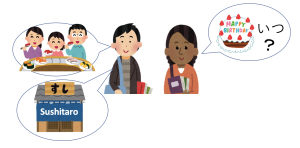Module 36.1 Dialogue
Title
Naomi Johnson asks about Takeshi Yamada’s birthday

| Language |
Script & Translation
|
Japanese |
|
Romanization |
1 Jonson: Jonson san, otanjoubi wa itsu desu ka?
2 Yamada: Senshuu no kinyoubi deshita. 3 Jonson: A, sou desu ka. Otanjoubi, omedetou gozaimasu. Dewa, otanjoubi no hi ni nanika simashita ka? 4 Yamada: Ee, Naomi san to resutoran de gohan o tabemashita. 5 Jonson: Resutoran wa doko deshita ka? 6 Yamada: Sushitarou deshita. |
English translation |
1 Johnson: Ms. Johnson, when is your birthday?
2 Yamada: It was last Friday. 3 Johnson: Oh, really? Happy birthday. Did you do anything on your birthday then? 4 Yamada: Yes, I ate at a restaurant with Naomi. 5 Johnson Where was the restaurant? 6 Yamada: It was Sushitaro. |
Vocabulary
More Useful Words
Grammar Notes
| 何を vs. 何か |
何か (nani ka) is a Japanese word that means “something.” It is often used in sentences when referring to an unspecified object or thing.
何を (nani o), however, means “what”. It is used to ask for specific information.
| Using 何を (what) to ask a question | |||
| Question | 今日は何を食べますか。 | Kyou wa nani o tabemasu ka? | What are you eating today? |
| Affirmative answer | すしを食べます。 | Sushi o tabemasu. | I will have sushi. |
| Negative answer | 今日は何も食べません。 | Kyou wa nani mo tabemasen. | Today I will not have anything. |
| Using 何か (something) to ask a question | |||
| Question | 今日は何か食べますか。 | Kyou wa nani ka tabemasu ka? | Are you eating anything today? |
| Affirmative answer | ええ、すしを食べます。 | Ee, sushi o tabemasu. | Yes, I will have sushi. |
| Negative answer | いいえ、何も食べません。 | Iie, nani mo tabemasen. | No, I will not have anything. |
Note: when using 何も to answer the question, the verbs are in negative form. See below for more example sentences.
| 今日は何も食べません。 | Kyou wa nani mo tabemasen. | Today I will not eat anything. |
| 今日は何も飲みません。 | Kyou wa nani mo nomimasen. | Today I will not drink anything. |
| 何もわかりません。 | Nani mo wakarimasen. | I do not understand anything. |
やまだ
たんじょうび
せんしゅう
きんようび
ひ
なに
はん
た
